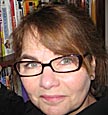Writers Talk Shop, Novel, and Pitch Conference
Commentary by conference attendees

A Conversation With Randy Susan Meyers
 Randy Susan Meyers has co-authored a nonfiction book and published short stories and articles. She was a finalist in the William Faulkner-William Wisdom novel-in-progress
competition. Her serious women's fiction is informed by years of work with domestic
violence victims. Ms. Meyers taught fiction revision at Boston's Grub Street Writers' Center
where she is an active member of the Master Fiction Workshop led by Jenna Blum. Several
years of tending bar offered Ms. Meyers a unique perspective into the minds of men,
solidifying the theory that in vino veritas. Randy Susan Meyers has co-authored a nonfiction book and published short stories and articles. She was a finalist in the William Faulkner-William Wisdom novel-in-progress
competition. Her serious women's fiction is informed by years of work with domestic
violence victims. Ms. Meyers taught fiction revision at Boston's Grub Street Writers' Center
where she is an active member of the Master Fiction Workshop led by Jenna Blum. Several
years of tending bar offered Ms. Meyers a unique perspective into the minds of men,
solidifying the theory that in vino veritas.
______________
Selling a novel isn't like writing a novel. You have to leave the creative bubble. Face it, when you're in a bookstore, you rarely give books
by unknown authors long to prove themselves—a quick scan of the book jacket copy, a look at the blurbs, and then maybe a read of the first few paragraphs. Why should editors or
agents be any different?
- RSM
______________
NYC: How would you compare New York Pitch Conference to other writer conferences?
RSM: This isn't a craft workshop, nor is it a giant mix and mingle conference. The focus is sharp.
The critique isn't for the faint of heart, but is for those who truly want to hear where they
need to work on their novel, how commercial their ideas are, and about the
effectiveness of their pitch—which then translates into one's query letter. This isn't to say
that one is discouraged, it's simply tough love. Selling a novel isn't like writing a novel. You
have to leave the creative bubble. Face it, when you're in a bookstore, you rarely give books
by unknown authors long to prove themselves—a quick scan of the book jacket copy, a look
at the blurbs, and then maybe a read of the first few paragraphs. Why should editors or
agents be any different? New York Pitch Conference offers an in-depth opportunity to learn the
skills you need to capture the first tug of attention.
NYC: What inspired you to write ADOPTING ADULTS?
RSM: In ADOPTING ADULTS sisters cling to each other in the aftermath of their mother's
murder and their father's imprisonment for the crime. The novel encompasses thirty years of
their lives. My inspiration was threefold. First, when I led groups for batterers, I saw the
men's fascination with themselves; when I spoke with their victims, they, of course, had to
concentrate on survival. The children—the witnesses—their voices were too quiet. Second, I
couldn't stop thinking about an article regarding a woman whose brother killed everyone in
the family but her. That woman's dilemma—the one left behind—haunted me. Third, when
my sister and I were children our family had an event quite similar to the opening to my
book—except that my mother wasn't murdered. That was my 'what if.'
NYC: How has the story evolved?
RSM: The book grew from one sister's point of view, to both sisters narrating the story. It then
became as much a novel about their entwined relationship as it was about their father killing
their mother. For me, the largest evolution was finding out how these very different women
dealt with handling their imprisoned father. In the end, I couldn't wait to find out what
happened.
NYC: What made you choose to attend the New York Pitch Conference?
RSM: After I finished the revisions for ADOPTING ADULTS, I researched conferences where
agents read and considered your work. When I came across the New York Pitch Conference
workshop, I was attracted to the concept of learning about selling and presentation. I liked
the idea of being in a small group with the same people for four days and became excited at
the prospect of having editors consider my work.
NYC: Do you feel the novel is improved as a result?
RSM: My query and my pitch became more polished. The response to my novel gave me the
confidence to move forward with selling my book. Let's face it; writing is solitary work. The
conference offered a chance for me to get out of my sweatpants and work on my public
face.
NYC: What did you find most effective about the New York experience?
RSM: Do I have to pick just one thing? The editors were extraordinarily generous with their advice
on everyone's pitches and presentation. Much credit goes to the work we did the first day:
polishing, cutting, and revising our presentations, as well as the pre-workshop email
exhorting us to be ready on day one. Being allowed to hear other writer's pitch their work
helped enormously. If you listened critically to your fellow group members, you quickly
learned what worked and what didn't. I suppose we became each other's tutorials.
NYC: Where does ADOPTING ADULTS go from here?
RSM: Three editors asked to read it. I hope that it clicks, but if it doesn't, perhaps I can learn
where I need to tweak or change. Meanwhile, I've started my next book, New Jersey
Honor, so that I don't spend all my time checking email and praying.
Click here for more details about the conference.
If you need to contact us click here.
|